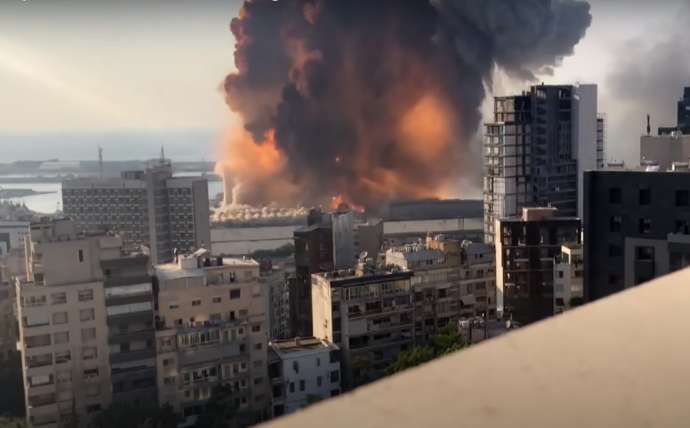Časoris is an online newspaper aimed at children. Each week we’ll take an article and post it here as a Slovene-English dual text.
Eksplozija v Libanonu
Explosion in Lebanon
Written by Romana Dobnikar Šeruga, translated by JL Flanner & G Translate
Bejrut, glavno mesto Libanona, je prizadela huda nesreča. V torkovi eksploziji je umrlo najmanj 137 oseb, 5.000 ljudi je ranjenih, 300.000 meščanov pa je izgubilo streho nad glavo.
Beirut, the capital of Lebanon, was hit by a severe disaster. Tuesday's blast killed at least 137 people, injured 5,000 and left 300,000 citizens homeless.
V času eksplozije je bil v Bejrutu tudi znani slovenski borec za človekove pravice Tomo Križnar. Za dnevnik RTV SLO je povedal: »Poblisknilo je tako, kot gledamo v filmih ob jedrskih eksplozijah … Prišlo je v dveh valovih, naenkrat je vse ven zmetalo, potem nas je zagrnila črna noč …«
At the time of the explosion a well-known Slovenian human rights activist was also in Beirut, Tomo Križnar. He told the daily RTV SLO: “It flashed the way we see in movies during nuclear explosions… It came in two waves, suddenly everything was blown out, then we were enveloped in a black night…”
Kaj se je zgodilo?
What happened?
Zaradi neprimernega skladiščenja je v bejrutskem pristanišču razneslo 2750 ton amonijevega nitrata, ki so ga pred leti zasegli na neki ladji. Amonijev nitrat se uporablja kot gnojilo in razstrelivo.
Due to improper storage, 2,750 tonnes of ammonium nitrate, seized on a ship years ago, exploded in the port of Beirut. Ammonium nitrate is used as a fertilizer and explosive.
Mesto je močno poškodovano. »Bejrut potrebuje hrano, Bejrut potrebuje obleke, hiše, material za gradnjo hiš. Bejrut potrebuje prostor za begunce,« pravi bejrutski guverner Marvan Abud.
The city is badly damaged. “Beirut needs food, Beirut needs clothes, houses, materials to build houses. Beirut needs space for refugees, ”says Beirut Governor Marvan Abud.
Številne države, organizacije in posamezniki so poslali na pomoč letala z reševalci, zdravstvene delavce in zdravstveno opremo.
Many countries, organizations and individuals have sent planes to the rescue with paramedics, medical staff and medical equipment.
Tragedija v mestu, ki je v zadnjih petdesetih letih doživelo več uničevalnih vojn, je opomnik, kako hude posledice imata lahko malomarnost in brezbrižnost oblasti pri zagotavljanju varnosti ljudem.
The tragedy in a city that has experienced several devastating wars in the last fifty years is a reminder of how severe the effects can be of the negligence and indifference of the authorities in ensuring the safety of the people.
Bejrutska eksplozija je »nedvomno ena največjih nejedrskih eksplozij v zgodovini«, so sporočili britanski strokovnjaki. Imela je približno desetino eksplozivne moči jedrske bombe, ki so jo ZDA med drugo svetovno vojno, 6. avgusta 1945, odvrgle na japonsko mesto Hirošima. Takoj je umrlo 80.000 ljudi, na desettisoče pa jih je umrlo kasneje zaradi izpostavljenosti sevanju.
The Beirut explosion is "arguably one of the largest non-nuclear explosions in history," British experts said. It had about a tenth of the explosive power of a nuclear bomb dropped by the U.S. on the Japanese city of Hiroshima during World War II on August 6, 1945. Eighty thousand people died instantly, and tens of thousands later died from radiation exposure.
Ob 8.15 po krajevnem času, natanko 75 let po eksploziji atomske bombe nad mestom, je včeraj v Hirošimi zadonel bronast zvon miru. Jedrske vojne ne bo nikoli več le, če bo jedrsko orožje popolnoma odstranjeno, je opozoril generalni sekretar Združenih narodov Antonio Guterres.
At 8.15 am local time, exactly 75 years after the atomic bomb exploded over the city, a bronze peace bell rang in Hiroshima yesterday. There will never be a nuclear war only if nuclear weapons are completely removed, warned United Nations Secretary-General Antonio Guterres.
Read more stories and improve your Slovene at Časoris, while all our dual texts can be found here.







